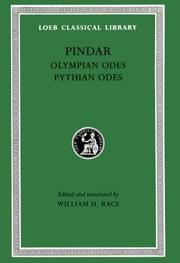| Listing 1 - 3 of 3 |
Sort by
|
Book
ISBN: 9780674996748 0674996747 Year: 2014 Volume: 521 Publisher: Cambridge: Harvard university press,
Abstract | Keywords | Export | Availability | Bookmark
 Loading...
Loading...Choose an application
- Reference Manager
- EndNote
- RefWorks (Direct export to RefWorks)
Philostratus's writings embody the height of the renaissance of Greek literature in the second century CE. Heroicus is a vineyard conversation about the beauty, continuing powers, and worship of the Homeric heroes. Gymnasticus is the sole surviving ancient treatise on sports, which reshapes conventional ideas about the athletic body.
Dialogues, Greek --- Gymnastics --- Gymnastics. --- Hero worship --- Heroes --- Physical education and training --- Protesilaus (Greek mythology) --- Trojan War --- Philostratus, --- Protesilaus --- Greece --- Athletic training --- Education, Physical --- P.E. (Physical education) --- PE (Physical education) --- Phy ed --- Phys ed --- Physical culture --- Physical training --- Sports --- Training, Physical --- Heroism --- Greek dialogues --- Sports training --- Athletics --- Hero cult --- Training --- Filostrat, Flaviĭ, --- Filóstrato, --- Filostrato, Flavio, --- Filostrato, --- Filostratos, Flawiusz, --- Flavio Filostrato, --- Flavius Philostratus, --- Flawiusz Filostratos, --- Philostratos, --- Philostratos, Phlauios, --- Philostratus, Flavius --- Philostratus, Flavius, --- Philostratus --- Phlauios Philostratos, --- Protesilajas --- Protesilao --- Prōtesilaōs --- Protésilas --- Protesilau --- Prōtesileōs --- Протесилай --- Πρωτεσίλεως --- Πρωτεσίλαως --- Πρωτεσίλαος --- 프로테실라오스 --- プローテシラーオス --- Протесилај --- Протесілай --- Ancient Greece --- Ellada --- Ellas --- Ellēnikē Dēmokratia --- Elliniki Dimokratia --- Grčija --- Grèce --- Grecia --- Griechenland --- Hellas --- Hellenic Republic --- Hellēnikē Dēmokratia --- Kingdom of Greece --- République hellénique --- Royaume de Grèce --- Vasileion tēs Hellados --- Yaṿan --- Education --- Exercise --- Persons --- Antiheroes --- Apotheosis --- Courage --- Superheroes --- Mythology, Greek --- Greek literature --- Worship --- Hellada --- Olympic games (Ancient) --- Sophists (Greek philosophy) --- Medicine --- Jeux olympiques de l'Antiquité --- Sophistes grecs --- Médecine --- Early works to 1800 --- Philosophy --- Ouvrages avant 1800 --- Philosophie --- Early works to 1800. --- al-Yūnān --- Gret͡sii͡ --- Xila --- Yūnān --- Trojan War.

ISBN: 0674995643 9780674995642 Year: 1997 Volume: 56, 485 Publisher: Cambridge (Mass.): Harvard university press,
Abstract | Keywords | Export | Availability | Bookmark
 Loading...
Loading...Choose an application
- Reference Manager
- EndNote
- RefWorks (Direct export to RefWorks)
Of the Greek lyric poets, Pindar (ca. 518-438 BCE) was "by far the greatest for the magnificence of his inspiration" in Quintilian's view; Horace judged him "sure to win Apollo's laurels." The esteem of the ancients may help explain why a good portion of his work was carefully preserved. Most of the Greek lyric poets come down to us only in bits and pieces, but nearly a quarter of Pindar's poems survive complete. William H. Race now brings us, in two volumes, a new edition and translation of the four books of victory odes, along with surviving fragments of Pindar's other poems. Like Simonides and Bacchylides, Pindar wrote elaborate odes in honor of prize-winning athletes for public performance by singers, dancers, and musicians. His forty-five victory odes celebrate triumphs in athletic contests at the four great Panhellenic festivals: the Olympic, Pythian (at Delphi), Nemean, and Isthmian games. In these complex poems, Pindar commemorates the achievement of athletes and powerful rulers against the backdrop of divine favor, human failure, heroic legend, and the moral ideals of aristocratic Greek society. Readers have long savored them for their rich poetic language and imagery, moral maxims, and vivid portrayals of sacred myths.Race provides brief introductions to each ode and full explanatory footnotes, offering the reader invaluable guidance to these often difficult poems. His new Loeb Classical Library edition of Pindar also contains a helpfully annotated edition and translation of significant fragments, including hymns, paeans, dithyrambs, maiden songs, and dirges.
Athletics --- Games --- Laudatory poetry, Greek --- Jeux --- Sports athlétiques --- Poésie élogieuse grecque --- Poetry --- Translations into English --- Poésie --- Traductions anglaises --- Pindar --- Traductions en anglais --- Olympic games (Ancient) --- Poetry. --- -Games --- -Laudatory poetry, Greek --- -Olympic games (Ancient) --- Ancient Olympic games --- Olympics --- Greek laudatory poetry --- Greek poetry --- Children --- Children's games --- Games, Primitive --- Games for children --- Pastimes --- Primitive games --- Recreations --- Entertaining --- Physical education and training --- Amusements --- Play --- Sports --- Recreation --- -Pindarus --- Pindare --- Pindaro --- Πίνδαρος --- -Translations into English --- -Pindar --- Píndaro --- Pindaros --- Pindarus --- Translations into English. --- Sports athlétiques --- Poésie élogieuse grecque --- Poésie --- Laudatory poetry, Greek - Translations into English --- Olympic games (Ancient) - Poetry. --- Athletics - Greece - Poetry. --- Games - Greece - Poetry.
Book
ISBN: 9789089645753 9789048521791 9789048521807 Year: 2014 Publisher: Amsterdam,
Abstract | Keywords | Export | Availability | Bookmark
 Loading...
Loading...Choose an application
- Reference Manager
- EndNote
- RefWorks (Direct export to RefWorks)
Sociology of religion --- Sociology of sport --- 2:7 --- 796.011.2 --- Sports --- Sportsociologie --- Sport en maatschappij --- sport --- sociologie --- godsdienst --- 796.011.2 Sport en religie --- Sport en religie --- 2:7 Godsdienst. Theologie-:-Kunst. Ruimtelijke ordening. Architectuur. Sport en spel --- Godsdienst. Theologie-:-Kunst. Ruimtelijke ordening. Architectuur. Sport en spel --- Field sports --- Pastimes --- Recreations --- Recreation --- Athletics --- Games --- Outdoor life --- Physical education and training --- Sociology of sports --- Sociology --- Religion and sports --- Sports (in religion, folklore, etc.) --- Religious aspects --- Sociological aspects --- Social aspects --- 796.011.2 Sport en religie. Theologie en religie --- Sport en religie. Theologie en religie
| Listing 1 - 3 of 3 |
Sort by
|

 Search
Search Feedback
Feedback About UniCat
About UniCat  Help
Help News
News